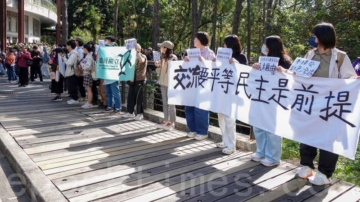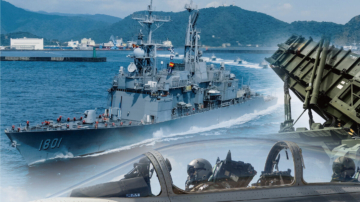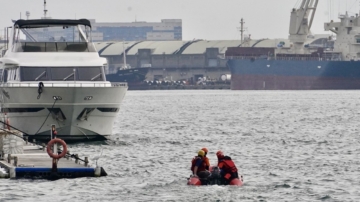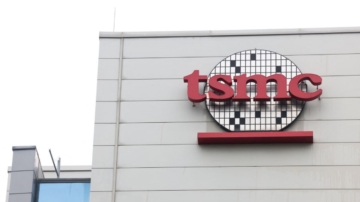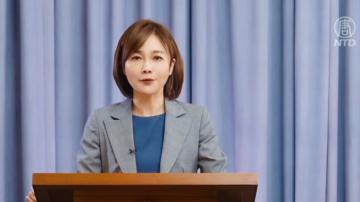【新唐人2011年2月10日訊】中華民國總統馬英九在中央新春茶會上致詞時指出,堅持九二共識,為維護主權,未來政府機關文書用語提到對岸時,一律改稱大陸或對岸,不稱中國,以免產生兩個中國的主權混淆情況。
馬英九總統在中央新春茶會上,認為現行的政府文書裡,經常出現中國兩字,這違反憲法中「中華民國是唯一中國」的精神,也不符合兩岸「一個中國、各自表述」對等尊嚴溝通與談判的基礎。馬英九總統還強調,根據憲法的精神,台灣對大陸的立場是:不承認其主權、不否認其治權。兩岸政策及合作交流,都應該建立在這個法律基礎上。
不過,在最近有關兩岸關係的研討會上,有專家指出,兩岸關係進一步發展的障礙,在於政治制度的巨大差異。北京獨立知識份子、憲政專家張博樹對《美國之音》表示:「就兩岸之間的整體關係來看,政治和經濟兩個方面,的確有一個問題。兩岸政治關係遠不如經濟關係密切,因為兩岸社會制度不一樣。表面看是統獨問題,實際是各自都有獨立的政治實體,同時各自執行的又是不同的社會制度。」
兩岸未來關係如何進一步發展,張博樹認為:「恐怕前提就是大陸這方面的政治體制要加速改革。不在改變中國大陸現有政治結構上做出實質性的動作,很難想像台灣老百姓、知識份子,不管是誰當政,恐怕都不好接受中國現在大陸這方面的政治制度。」
美國的臺海事務專家任雪麗(Shelley Rigger)則認為,美國、大陸、台灣三方在胡錦濤訪美期間,都強調彼此關係的積極面,不過隨著臺海軍力失衡情況日漸嚴重,三者之間的矛盾只會更加嚴重。
任雪麗指出:臺海軍力日漸失衡,大陸對臺軍事部署有增無減,但各自長期目標並沒有改變。也就是:美國將繼續依據「台灣關係法」維持對臺安全承諾,出售武器給台灣;而大陸依然堅持對臺擁有主權;台灣人民則希望維持獨立現狀,無意與大陸統一。任雪麗認為,儘管現階段避開衝突符合臺北、北京和華盛頓三方的利益,不過臺海軍力日漸失衡的事實,讓存在於三者之間的矛盾難以完全消除。
關於美國對台灣的立場,美國助理國務卿坎貝爾(Kurt Campbell)強調:「在胡錦濤來訪前,克林頓國務卿重申:對三個公報和「台灣關係法」的承諾。歐巴馬總統也在胡錦濤訪問期間的公開聲明中,強調美國在「台灣關係法」之下的特別義務。」, 坎貝爾說:「我們非常了解我們的責任。」
新唐人記者宋風、周平綜合報導。
Trends in US-China-Taiwan Relations
Taiwanese president Ma said at a New Year Party
Taiwan should keep the one-China consensus.
Official document should use Mainland or cross-strait,
instead of China. That way, there will be
no confusion that there are two Chinas.
Taiwanese President Ma Ying-jeou stated
at a central government』s New Year Party,
use of the word “China” in official documents
violates the constitution that
“Republic of China is the only China.”
It also contradicts with the consensus with Beijing
on “One China with respective interpretations.”
Ma stressed that Taiwan does not recognize
mainland』s sovereignty, but does not deny its rule.
Cross-strait relations should abide by this position.
Experts believe the obstacle to cross-strait relations
is the difference in political systems.
Constitutional scholar Zhang Boshu said to VOA:
There are issues in economic and political aspects
of cross-strait relationship.
Political tie is not as close as economic tie.
On the surface it is about unity or independence, but
the real reason lies in the different political entity
and different political systems.
To further cross-strait relationship,
Zhang believes mainland needs to speed up
political reform. Without fundamental changes,
it is hard to imagine Taiwanese people
will accept mainland』s current political system.
According Shelley Rigger, a US expert on Taiwan,
during Hu Jintao』s US visit, US and China focused
on positive aspects of Sino-US relationship.
But as Taiwanese military looses its balance,
conflicts will deepen in the tri-party relations.
Shelley Rigger said,
Taiwanese military is losing its balance
as mainland military installment increases.
The US will continue to sell weapons to Taiwan
according to Taiwan Relations Act.
China will continue to insist on sovereignty
while Taiwanese people hope for independence.
Avoiding conflicts is the interests of all parties,
but with the military imbalance,
conflicts cannot be resolved.
Kurt Campbell , US Assistant Secretary of State,
said before Hu』s visit, Hilary Clinton reiterated
the US promise under Taiwan Relations Act.
President Obama also stated during Hu』s visit
that US has obligations under the Act.
Campbell said the US recognizes its responsibilities.
TND Reporter Song Feng
馬英九總統在中央新春茶會上,認為現行的政府文書裡,經常出現中國兩字,這違反憲法中「中華民國是唯一中國」的精神,也不符合兩岸「一個中國、各自表述」對等尊嚴溝通與談判的基礎。馬英九總統還強調,根據憲法的精神,台灣對大陸的立場是:不承認其主權、不否認其治權。兩岸政策及合作交流,都應該建立在這個法律基礎上。
不過,在最近有關兩岸關係的研討會上,有專家指出,兩岸關係進一步發展的障礙,在於政治制度的巨大差異。北京獨立知識份子、憲政專家張博樹對《美國之音》表示:「就兩岸之間的整體關係來看,政治和經濟兩個方面,的確有一個問題。兩岸政治關係遠不如經濟關係密切,因為兩岸社會制度不一樣。表面看是統獨問題,實際是各自都有獨立的政治實體,同時各自執行的又是不同的社會制度。」
兩岸未來關係如何進一步發展,張博樹認為:「恐怕前提就是大陸這方面的政治體制要加速改革。不在改變中國大陸現有政治結構上做出實質性的動作,很難想像台灣老百姓、知識份子,不管是誰當政,恐怕都不好接受中國現在大陸這方面的政治制度。」
美國的臺海事務專家任雪麗(Shelley Rigger)則認為,美國、大陸、台灣三方在胡錦濤訪美期間,都強調彼此關係的積極面,不過隨著臺海軍力失衡情況日漸嚴重,三者之間的矛盾只會更加嚴重。
任雪麗指出:臺海軍力日漸失衡,大陸對臺軍事部署有增無減,但各自長期目標並沒有改變。也就是:美國將繼續依據「台灣關係法」維持對臺安全承諾,出售武器給台灣;而大陸依然堅持對臺擁有主權;台灣人民則希望維持獨立現狀,無意與大陸統一。任雪麗認為,儘管現階段避開衝突符合臺北、北京和華盛頓三方的利益,不過臺海軍力日漸失衡的事實,讓存在於三者之間的矛盾難以完全消除。
關於美國對台灣的立場,美國助理國務卿坎貝爾(Kurt Campbell)強調:「在胡錦濤來訪前,克林頓國務卿重申:對三個公報和「台灣關係法」的承諾。歐巴馬總統也在胡錦濤訪問期間的公開聲明中,強調美國在「台灣關係法」之下的特別義務。」, 坎貝爾說:「我們非常了解我們的責任。」
新唐人記者宋風、周平綜合報導。
Trends in US-China-Taiwan Relations
Taiwanese president Ma said at a New Year Party
Taiwan should keep the one-China consensus.
Official document should use Mainland or cross-strait,
instead of China. That way, there will be
no confusion that there are two Chinas.
Taiwanese President Ma Ying-jeou stated
at a central government』s New Year Party,
use of the word “China” in official documents
violates the constitution that
“Republic of China is the only China.”
It also contradicts with the consensus with Beijing
on “One China with respective interpretations.”
Ma stressed that Taiwan does not recognize
mainland』s sovereignty, but does not deny its rule.
Cross-strait relations should abide by this position.
Experts believe the obstacle to cross-strait relations
is the difference in political systems.
Constitutional scholar Zhang Boshu said to VOA:
There are issues in economic and political aspects
of cross-strait relationship.
Political tie is not as close as economic tie.
On the surface it is about unity or independence, but
the real reason lies in the different political entity
and different political systems.
To further cross-strait relationship,
Zhang believes mainland needs to speed up
political reform. Without fundamental changes,
it is hard to imagine Taiwanese people
will accept mainland』s current political system.
According Shelley Rigger, a US expert on Taiwan,
during Hu Jintao』s US visit, US and China focused
on positive aspects of Sino-US relationship.
But as Taiwanese military looses its balance,
conflicts will deepen in the tri-party relations.
Shelley Rigger said,
Taiwanese military is losing its balance
as mainland military installment increases.
The US will continue to sell weapons to Taiwan
according to Taiwan Relations Act.
China will continue to insist on sovereignty
while Taiwanese people hope for independence.
Avoiding conflicts is the interests of all parties,
but with the military imbalance,
conflicts cannot be resolved.
Kurt Campbell , US Assistant Secretary of State,
said before Hu』s visit, Hilary Clinton reiterated
the US promise under Taiwan Relations Act.
President Obama also stated during Hu』s visit
that US has obligations under the Act.
Campbell said the US recognizes its responsibilities.
TND Reporter Song Feng

